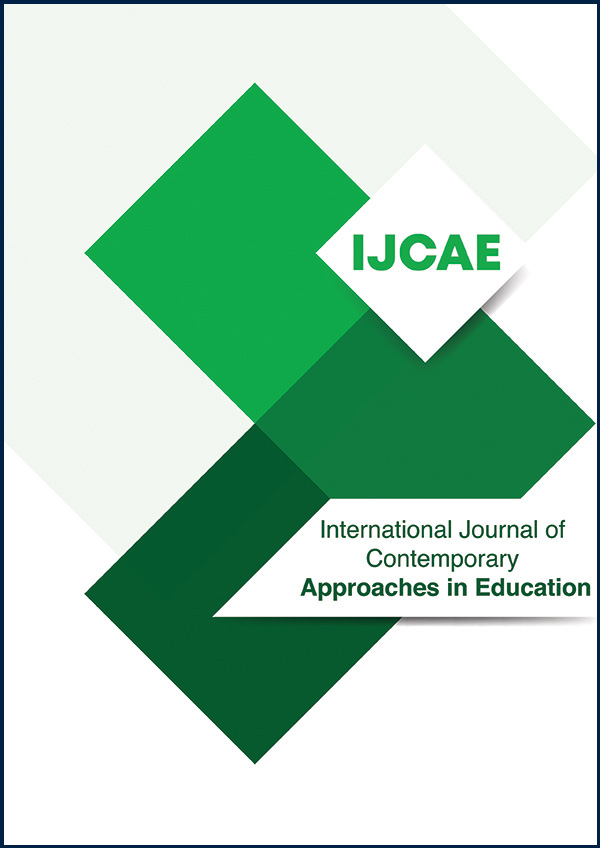- Akbaş, O., & Duman, S. /2018). Backward Design and the Focus on Big Ideas in Curriculum within the Context of Understanding by Design (UbD), VI. Internetıonal Multidisciplinary Congress of Eurasia, 139-142. [Google Scholar]
- Altun, S., & Yücel Toy, B. (2021). Designer teachers designing (3rd ed.). Pegem Academy. [Google Scholar]
- Altun, T., & Yurtseven, N. (2021). Examining the effects of UbD-based instruction on student understanding and participation. Journal of Educational Theory and Practice, 17(2), 123–137. [Google Scholar]
- Ayyıldız, N. (2023). Reducing misconceptions in science education through UbD-based teaching. Turkish Journal of Science Education, 20(1), 45–61. [Google Scholar]
- Büyüköztürk, Ş. (2011). Handbook of data analysis for social sciences (28th ed.). Pegem Academy. [Google Scholar]
- Çinkaya, Y. K. (2022). Combining UbD and flipped classroom: Impacts on science achievement and retention. Journal of Curriculum Research, 5(3), 89–105. [Google Scholar]
- Driver, R., Asoko, H., Leach, J., Mortimer, E., & Scott, P. (1994). Constructing scientific knowledge in the classroom. Educational Researcher, 23(7), 5–12. https://doi.org/10.3102/0013189X023007005 [Google Scholar] [Crossref]
- Erdağı, T. (2024). The impact of UbD model on sustainability awareness and cooperative learning in social studies. Social Education Review, 29(1), 14–29. [Google Scholar]
- Gürbüz, Ö. (2022). The role of UbD in enhancing 21st-century skills in science education. Middle School Pedagogy Journal, 8(1), 97–112. [Google Scholar]
- Kalemkuş, F. (2023). Examining digital competencies through UbD in middle school science. Journal of Science and Technology Education, 14(2), 133–149. [Google Scholar]
- Kalemkuş, F., & Bulut Özek, A. (2022). Development and validation of the Comprehensive 21st Century Skills Scale. Turkish Educational Measurement and Evaluation Journal, 13(4), 215–233. [Google Scholar]
- McTighe, J., & Wiggins, G. (1999). Understanding by design. Alexandria, VA: ASCD. [Google Scholar]
- Mete, G., (2021). Development of a 21st-Century Skills Scale for Middle School Students: A Study on Validity and Reliability. The Journal of Social Sciences, 8(51), 196-208 [Google Scholar]
- Ministry of National Education [MoNE]. (2018). Science curriculum for primary education (Grades 3–8). Republic of Türkiye Ministry of National Education, Board of Education and Discipline. [Google Scholar]
- Ministry of National Education [MoNE]. (2023). National monitoring report on educational indicators. Retrieved from https://milli-egitim.gov.tr [Google Scholar]
- Ministry of National Education [MoNE]. (2024). PISA and TIMSS 2022–2023 reports. Retrieved from https://milli-egitim.gov.tr [Google Scholar]
- Ministry of National Education [MoNE].. (2018). Core skills and competencies. https://mufredat.meb.gov.tr/Veliler.aspx [Google Scholar]
- Ministry of National Education[MoNE]. (2023) . Research report on 21st-century skills and values. Board of Education and Discipline. https://ttkb.meb.gov.tr/www/baskanligimizca-21-yuzyil-becerileri-ve-degerlere-yonelik-arastirma-raporu-yayimlandi/icerik/509 [Google Scholar]
- Ministry of National Education[MoNE].. (2024). 2022 PISA Turkey report. https://pisa.meb.gov.tr/meb_iys_dosyalar/2024_03/21120745_26152640_pisa2022_rapor.pdf [Google Scholar]
- Ministry of National Education[MoNE].. (2024). TIMSS 2023 Turkey report. https://odsgm.meb.gov.tr/meb_iys_dosyalar/2024_12/23102111_timss2023rapor2012kapakli.pdf [Google Scholar]
- Özdemir, E., & Yurtseven, N. (2021). The effect of UbD-based differentiated science teaching on students’ motivation, scientific process skills, and academic achievement. Journal of National Education Academy, 7(1), 1–16. [Google Scholar]
- Partnership for 21st Century Learning. (2019). Framework for 21st century learning definitions. http://www.battelleforkids.org/networks/p21/frameworks-resources [Google Scholar]
- Saavedra, A. R., & Opfer, V. D. (2012). Learning 21st-century skills requires 21st-century teaching. Phi Delta Kappan, 94(2), 8–13. https://doi.org/10.1177/003172171209400203 [Google Scholar] [Crossref]
- [Google Scholar]
- Tanrıöver, S. (2022). Effects of STEM-based UbD instruction on problem-solving and metacognitive skills. Journal of Educational Innovations, 16(4), 55–74. [Google Scholar]
- Tabachnick, B. G., & Fidell, L. S. (2013). Using multivariate statistics (6th ed.). Pearson. [Google Scholar]
- Trilling, B., & Fadel, C. (2009). 21st century skills: Learning for life in our times. Jossey-Bass. [Google Scholar]
- Uçar, D. (2024). Analyzing teacher awareness in UbD-integrated sustainability education. International Review of Educational Research, 19(2), 42–58. [Google Scholar]
- Uyguç, H. O. (2022). The effect of UbD-based curriculum on students’ conceptual understanding in science. Educational Models and Practices Journal, 11(1), 101–120. [Google Scholar]
- Wiggins, G., & McTighe, J. (2005). Understanding by design (Expanded 2nd ed.). Alexandria, VA: ASCD. [Google Scholar]
- Yurtseven, N., & Altun, T. (2017). Effects of UbD-based design on EFL learners’ speaking skills. Language and Instruction Studies, 4(2), 33–47. [Google Scholar]
- Yurtseven, N., & Doğan, S. (2018). UbD applications in early childhood: Language development and planning competencies. Early Years Journal of Educational Research, 7(3), 55–72. [Google Scholar]
- Yıldız, B. (2021). Examining collaborative and creative learning gains through UbD model in middle school science. Pedagogical Studies, 12(1), 68–85. [Google Scholar]
|

